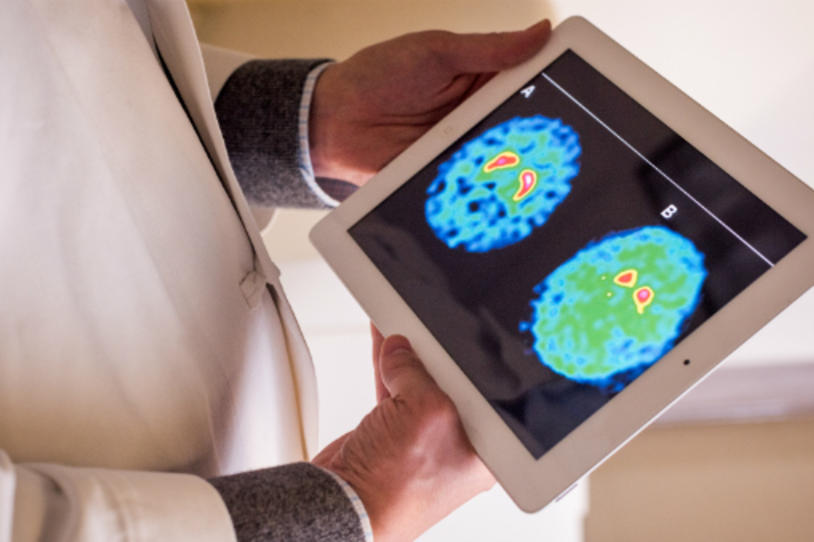
The Michael J. Fox Foundation (MJFF) announces 69 grants that total $60.6 million awarded in April and May 2025.
These grants support the development of novel therapies to treat Parkinson’s, tools to detect and measure the disease, and more. Find more on MJFF Funded Studies here.
Advancing Promising New Therapies in Pre-clinical Development
Most new therapies get their start in a laboratory. They then go through a long developmental stage to optimize and assess their safety and effectiveness. This translational stage of research is essential to fully vetting promising therapies before they can move into a clinical trial for testing in humans.
But because of its high cost and lack of guaranteed success, funding for it often is lacking. MJFF helps bridge the gap between discovery research and clinical trials with the Therapeutics Pipeline Program. The program ensures that experimental therapies with demonstrated potential for making a difference in the lives of people with PD continue to be tested.
Funded therapies hold potential to meet patients’ varied needs by targeting diverse mechanisms underlying PD. The program recently has provided funding to a range of projects that aim to slow or stop Parkinson’s from getting worse. These projects target mechanisms linked to the development of the disease, including neuroinflammation and the breakdown of structures within cells — the lysosomes that recycle waste and mitochondria that produce energy. The program also provides funding to therapies aiming to reduce the impact of Parkinson’s symptoms, including the walking and balance problems that often occur with the disease.
Driving Disease Insights with Banked PD Data
In 2023, researchers validated the first biological test for detecting Parkinson’s hallmark alpha-synuclein protein in people living with the disease. Years before outward symptoms develop, the test can identify Parkinson’s hallmark misfolded alpha-synuclein protein in spinal fluid.
Research funding from MJFF helped make that advance possible, along with data from our Parkinson’s Progression Markers Initiative (PPMI). The largest natural history study of people with PD worldwide, PPMI collects a wide range of data from participants, including clinic visit and patient-reported information, brain imaging scans and more than 760,000 banked blood, spinal fluid and skin biosamples.
Today, the Foundation is playing a major role in supporting the development of additional biomarkers for Parkinson’s, and many of these projects are made possible by the valuable data that PPMI has collected and banked. A range of tests using spinal fluid, blood and skin are advancing toward a goal of not only detecting the disease, but also measuring changes in it over time. These biomarkers could help researchers understand the biology that causes the disease to get worse over time and assess the impact of therapies designed to stop this biology.
Among the PPMI-enabled research that MJFF recently has funded is a study led by Anne Grünewald, PhD, at University of Luxembourg, to learn more about the role of mitochondria in Parkinson’s. Mining rich datasets from PPMI, the study aims to distinguish changes in cellular pathways related to mitochondria that increase the risk of developing PD. Findings could help improve the diagnosis of Parkinson’s and identify which individuals with the disease might benefit most from treatments targeting mitochondria.
More PPMI-driven research is coming, including from MJFF’s new PPMI Biofluid Biomarkers Program. The program funds studies using existing PPMI data to develop PD biomarkers that could improve the way Parkinson’s is classified and staged, both before and after symptom onset. Awards are expected to be announced in December.
Visualizing Parkinson’s in the Brain
Improved imaging biomarker tests for Parkinson’s also are a priority area. In the past year, the imaging field has seen advances in PD positron emission tomography (PET) imaging. PET scans use tracers specially designed to interact with a protein target in the brain and reveal information about it on 3D scans. Positive results from any of the six alpha-synuclein tracers in human trials could result in a breakthrough imaging tool capable of tracking changes in the brain linked to Parkinson’s.
Magnetic resonance imaging, or MRI, also shows growing promise to support diagnosis, monitor disease progression, and support patient stratification in Parkinson’s clinical trials, but technical challenges persist. To support the development of MRI biomarkers that overcome these challenges, MJFF opened the Molecular MRI Biomarker Program to applications last year. Projects funded through this program hold potential to improve clinical trials by helping researchers assess the impact of experimental therapies. Recently funded projects included:
- Researchers led by Stephane Lehericy, MD, PhD, at the Paris Brain Institute, are developing MRI tests to detect and monitor changes in Parkinson’s-related neurodegeneration. To do so, the tests measure the iron, water, and a pigment present in degenerating neurons, called neuromelanin, in the substantia nigra, a part of the brain that controls movement and is affected in PD.
- Using a different approach, a team led by Daniel Huddleston, MD, at Emory University, is developing an MRI technology to detect changes in brain chemicals linked to the disease.
- Duygu Tosun-Turgut, PhD, at University of California San Francisco, is leading a team in detecting the earliest stages of Parkinson’s with MRI. The team’s technology focuses on identifying changes in the brain microstructure that occur before symptoms become noticeable, with the goal of enabling earlier diagnosis and disease management.
A Robust Portfolio
The projects listed here illustrate the broad approach to Parkinson’s research at MJFF, and they only make up a portion of funded and supported research, which extends from individually selected projects to large studies and initiatives, including the Parkinson’s Progression Markers Initiative (PPMI) and the Aligning Science Across Parkinson’s Collaborative Research Network (ASAP CRN).
To learn more about active funding mechanisms at MJFF, visit our Funding Opportunities page.